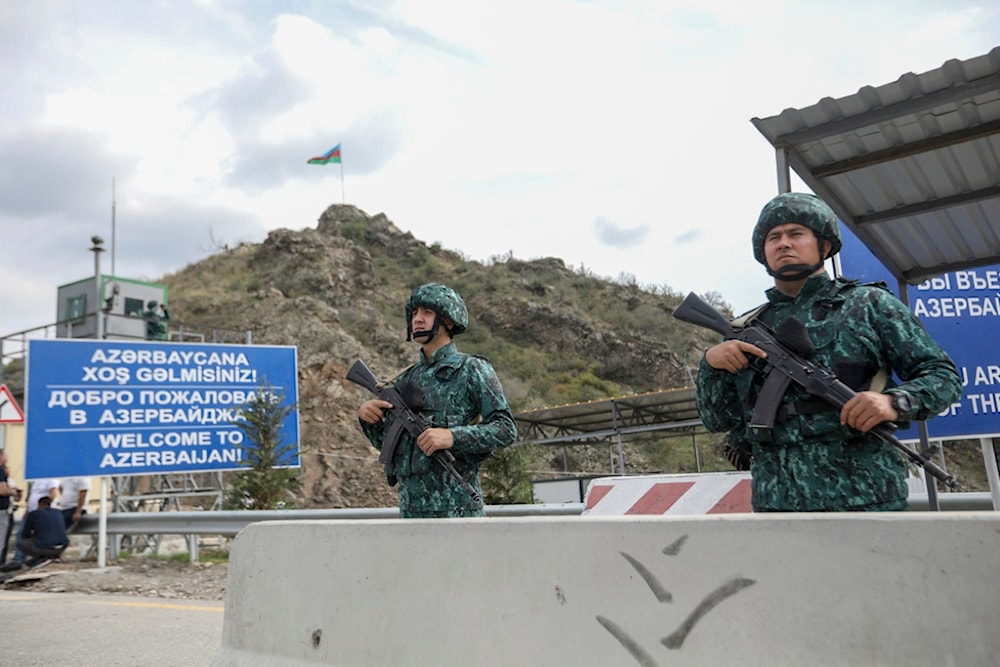Armenia seeking to mislead public about peace talks situation: Baku
The spokesperson for the Azerbaijani Foreign Ministry says an agreement between the two countries cannot be completed "by removing the non-agreed provisions from the draft, as Armenia suggested."
-

Azerbaijani servicemen guard the Lachin checkpoint in Azerbaijan, on Sunday, Oct. 1, 2023. (AP)
Armenia is seeking to mislead the public opinion about the actual situation, indicated Aykhan Hajizada, the spokesperson for the Azerbaijani Ministry of Foreign, in response to questions from local media concerning statements made by Armenia's Foreign Minister regarding a peace agreement and communication issues, as reported by the Azerbaijani Press Agency (APA).
Hajizada highlighted that Armenia submitted its comments on Azerbaijan’s June response to the draft bilateral Agreement on Peace and the Establishment of Interstate Relations between the two countries at the end of August—nearly 70 days later.
"Instead of adequately reacting to the commentary made by Azerbaijan, Armenia tried to turn a blind eye to the challenges by removing the necessary provisions that are necessary to be reflected in the draft. Even though 80% of the provisions have been agreed upon so far, not all of the draft’s provisions have been able to be agreed upon," he pointed out.
The Azerbaijani diplomat stressed that an agreement between the two countries cannot be completed "by removing the non-agreed provisions from the draft, as Armenia suggested. This cannot be considered acceptable."
Hajizada affirmed that "for the peace agreement to be sustainable and successful, problematic issues between the two countries in a number of directions must be clarified in the draft."
"While continuing its territorial claims against Azerbaijan and trying to restore the work of the Minsk Group, a remnant of the past conflict, Armenia’s call for the 'peace agreement' to be signed in any form by reducing the scope of the text raises many questions about this country’s true intentions," he explained.
The spokesperson also emphasized that before any agreement can be signed, Armenia must amend its Constitution, which still references territorial claims against Azerbaijan.
In the same context, Hajizada accused Yerevan of failing to act upon its obligations over the past four years to open communication routes connecting Azerbaijan's western regions with the Nakhchivan Autonomous Republic.
Baku never discussed third-party involvement in its territories
On the issue of involving a foreign private company to manage the passage of goods and passengers between the two countries, the Azerbaijani official clarified that Baku has never discussed third-party involvement in its territories.
His comments came after Armenian Foreign Minister Ararat Mirzoyan, during a joint press conference with his Luxembourgish counterpart, said that the draft "peace agreement" Armenia submitted to Azerbaijan was fully agreed upon and contained mutually accepted provisions.
Mirzoyan also denied any intention of granting third-party authority over roads passing through Armenia, while acknowledging that discussions had taken place regarding involving a foreign private company to ensure secure transportation of goods and passengers.
The Caucasus rivals, Armenia and Azerbaijan, have fought two wars—one in the 1990s and another in 2020—over the control of Nagorno-Karabakh, a region historically populated by ethnic Armenians.
In September, Baku regained control of the mountainous enclave through a one-day military offensive, which triggered the mass departure of the entire Armenian population, exceeding 100,000 people.
A key sticking point remains Baku's demand that Yerevan remove from its constitution a reference to Armenia's 1991 declaration of independence from the Soviet Union, which includes the unification of Armenia with Karabakh as a national objective.
Azerbaijan's President Ilham Aliyev has insisted that a peace agreement with Armenia is unattainable until Armenia drops its territorial claims to Karabakh from its constitution.
In May, Armenia returned four border villages to Azerbaijan, which had been under its control for decades. Armenian Prime Minister Nikol Pashinyan framed the move as part of his broader efforts to secure lasting peace with Azerbaijan.
Read more: Overwhelming Azerbaijani support for peace treaty with Armenia: Poll

 4 Min Read
4 Min Read








